| | In this edition: South Africa’s pivot, ride-hailing firms eye the safari market, Sudan’s stolen anti͏ ͏ ͏ ͏ ͏ ͏ |
| |  | Africa |  |
| |
|
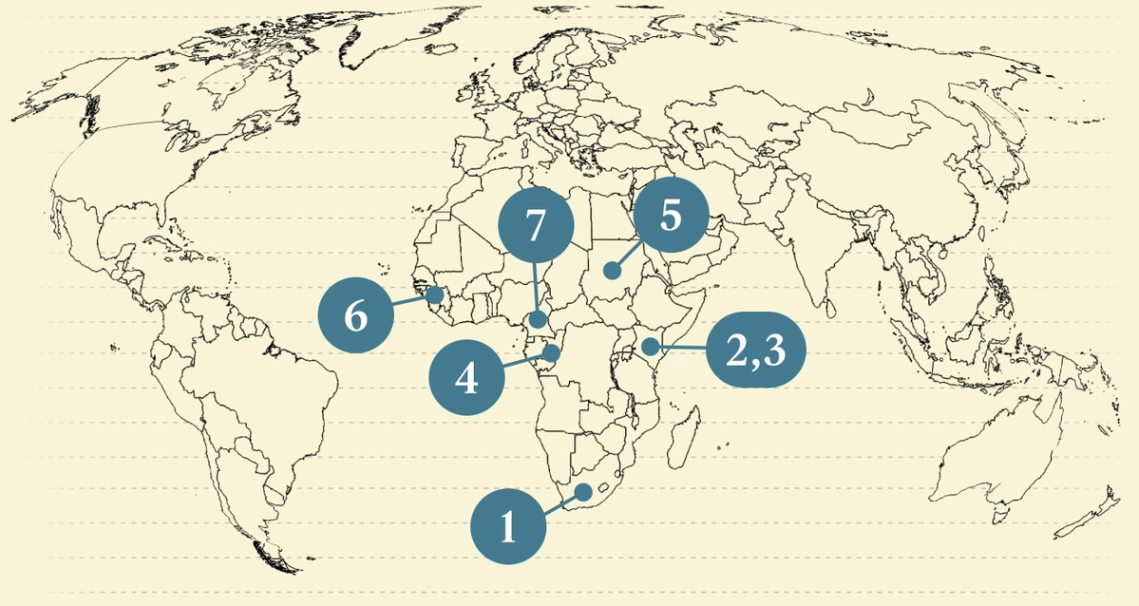 - S. Africa’s China-India pivot
- Uber, Bolt eye safari market
- Tems’ mentoring plans
- UNESCO race
- Sudan’s stolen antiquities
- Guinea’s coup leader
- Weekend Reads
 A Senegalese production of a classic Irish play. |
|
South Africa’s China-India pivot |
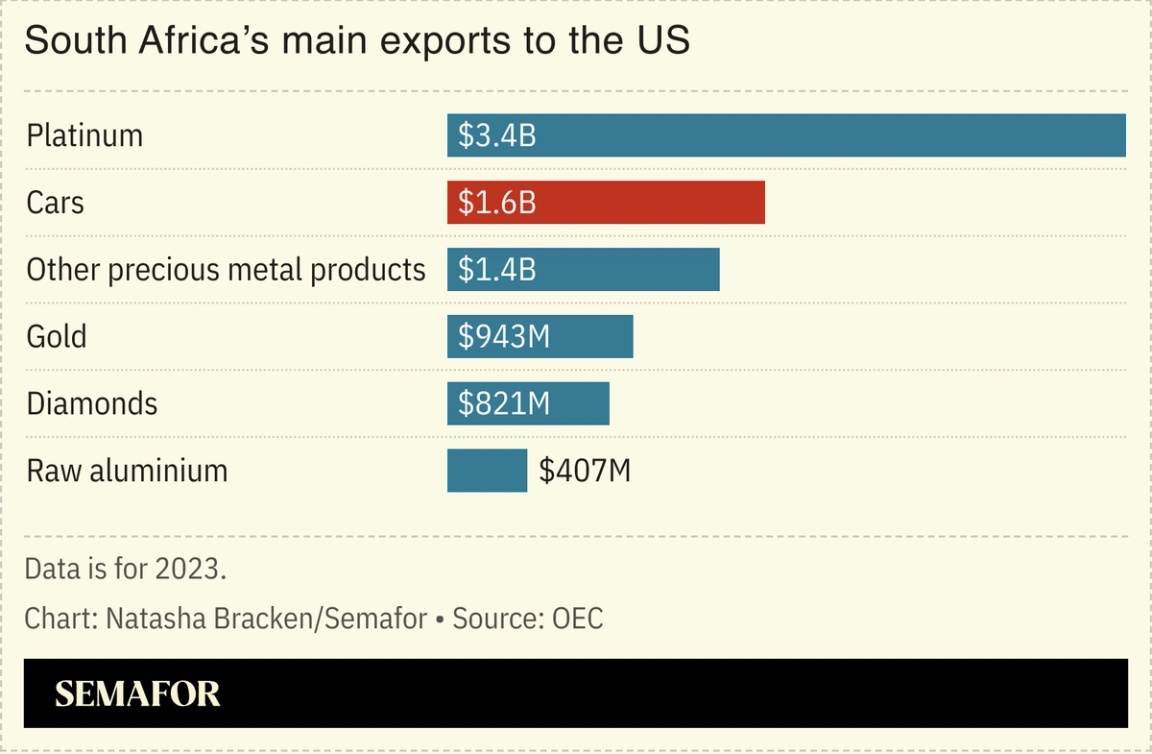 South Africa secured investments from China and India to boost its car manufacturing sector in a bid to salvage one of the industries hardest hit by Washington’s tariffs. US President Donald Trump imposed 30% levies on South African goods over what he claims are laws that discriminate against white South Africans. The rates have pummeled the country’s auto sector, with US-bound exports dropping 90% in the second quarter compared to the previous year. Pretoria warned the sweeping tariffs could cost Africa’s most industrialized economy as many as 100,000 jobs. Meanwhile, analysts warn that Washington’s levies, as well as the expiry this week of the African Growth and Opportunity Act (AGOA) — a preferential trade pact between the US and dozens of sub-Saharan African countries — will push the continent even closer to Beijing’s sphere of influence. This item first appeared in Flagship, Semafor’s daily global affairs briefing. Subscribe here. → |
|
|
Ride-hailing giants enter safari market |
| |  | Martin K.N Siele |
| |
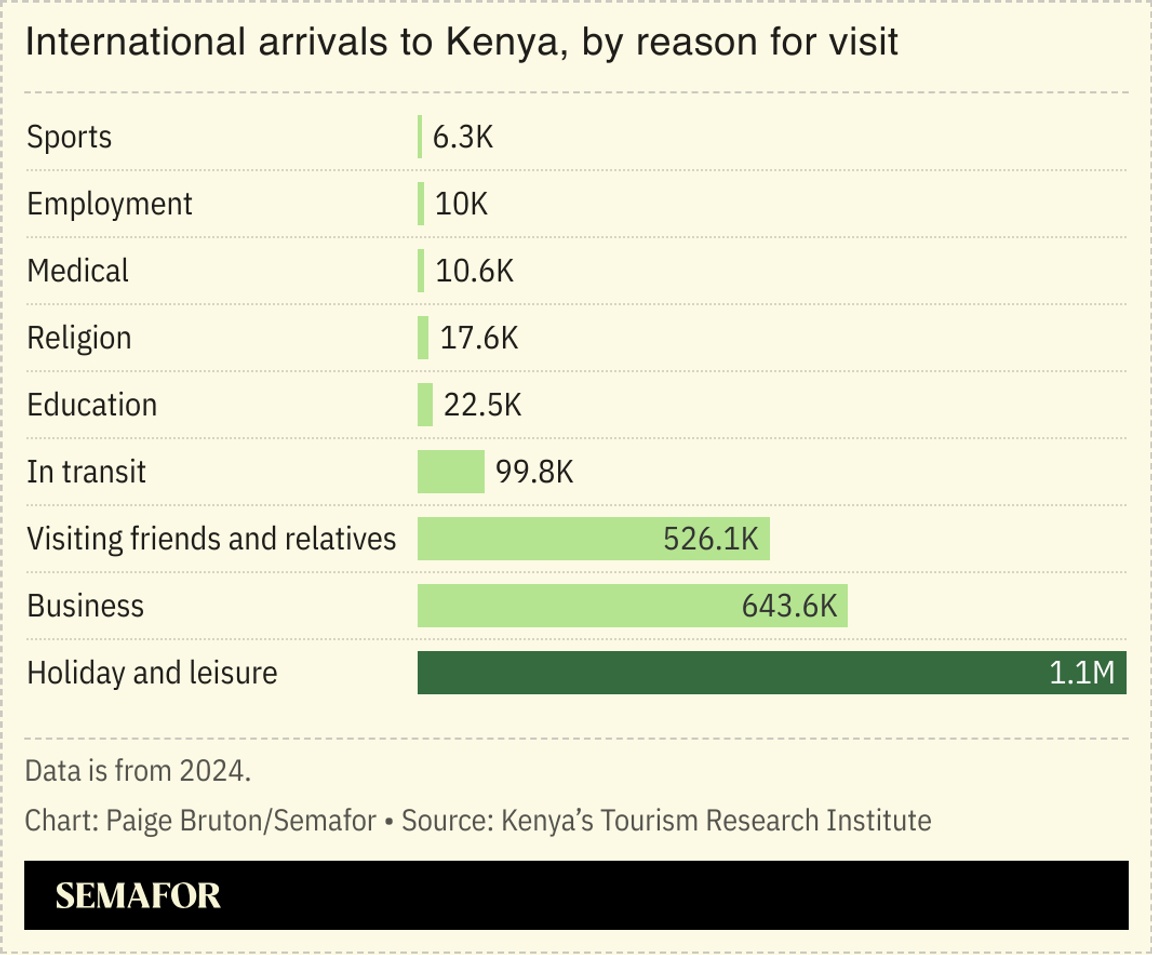 Ride-hailing giants Uber and Bolt are disrupting Kenya’s lucrative safari market with new services that are driving fears of price cuts among traditional tour operators. Uber, which began operating in Kenya a decade ago, launched its “Uber Safari” service in Nairobi on Sept. 15. Around a week later, Estonian rival Bolt said it would launch a safari service by the end of the year. Local safari operators have expressed concerns that the services will drive down prices, disrupting local operators in Kenya, where the tourism sector accounts for 10% of the country’s GDP. Uber East Africa General Manager Imran Manji told Semafor the company was “mindful of potential concerns around accessibility, pricing, and impact on local operators” and was working with licensed companies and the regulator. He said the company had no plans to expand the service to parks beyond Nairobi or outside of Kenya. |
|
Tems backs women in music industry |
| |  | Vivianne Wandera |
| |
 Ritzau Scanpix/Helle Arensbak/Reuters Ritzau Scanpix/Helle Arensbak/ReutersNigerian singer Tems wants to provide a route for African women to build careers in the global music industry through her new professional development program, the Afrobeats star told Semafor. The 30-year-old, whose real name is Temilade Openiyi, announced in August that applications were open for the Leading Vibe Initiative, a training program made up of workshops, resources, and mentorship. “I envision LVI as a platform that builds a pipeline of women who are not just artists on stage, but also producers, songwriters, music executives, entertainment lawyers, and decision makers leading across the industry,” Tems said during an interview in Nairobi, where she performed this week. “It’s about building infrastructure and networks that help women thrive in the music industry and creative economy.” A recent report by the Washington DC-based Brookings Institution think tank argued that formalizing cultural and creative industries could “bring tremendous growth to sub-Saharan African economies” because those sectors are currently concentrated in the informal economy. |
|
UNESCO candidate eyes more museums |
| | 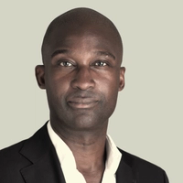 | Alexis Akwagyiram |
| |
 Firmin Edouard Matoko. Julien de Rosa/AFP via Getty Images. Firmin Edouard Matoko. Julien de Rosa/AFP via Getty Images.A UNESCO official vying to head the UN’s culture and education agency said he would build more museums in Africa to house artifacts returned from overseas if he secured the top job. Firmin Edouard Matoko, a veteran diplomat and economist from Congo Brazzaville, told Semafor the move would boost cultural tourism across the continent. Matoko, who is competing with Egypt’s former tourism minister to head UNESCO, welcomed the trend of recent years for countries to return artifacts stolen in the colonial era. “The issue is not only giving back the artifacts, but it’s also setting up a museum and training the people on how to preserve those artifacts,” he said in an interview, adding that this would help to prevent the “illicit” trade of returned items. Matoko said former colonial powers should be responsible for “some follow up action,” such as providing funding to build museums. Along with job creation, cultural tourism would offer countries a way to boost revenues through money spent by visitors in admission fees, hotels, restaurants, and souvenir shops. UNESCO’s executive board will vote on Oct. 6 to select its nominee. |
|
Sudan mourns its cultural heritage |
 The approximate number of antiques and artifacts counted as missing since the start of the war in Sudan two years ago, according to Sudan’s National Corporation of Antiquities and Museums. The cultural cost of the war has become clearer since the Sudanese army retook the capital Khartoum from the Rapid Support Forces (RSF) paramilitary group in March. Shattered pottery lies amid broken glass and bullet casings outside the country’s national museum, Reuters reported, and significant artifacts such as a gold collar from the pyramid of King Talakhamani at Nuri, which dates to the fifth century BC, have been reported missing. Most of the artifacts appear to have been smuggled into neighboring countries. Though Sudan’s tourism industry is still fairly nascent, yearly visitor numbers doubled between 2010 and 2018, reaching a high of 825,000. There is also huge potential: Sudan houses more pyramids than Egypt. The RSF “destroyed our identity, and our history,” Ikhlas Abdel Latif Ahmed, director of museums at Sudan’s NCAM, told the BBC. |
|
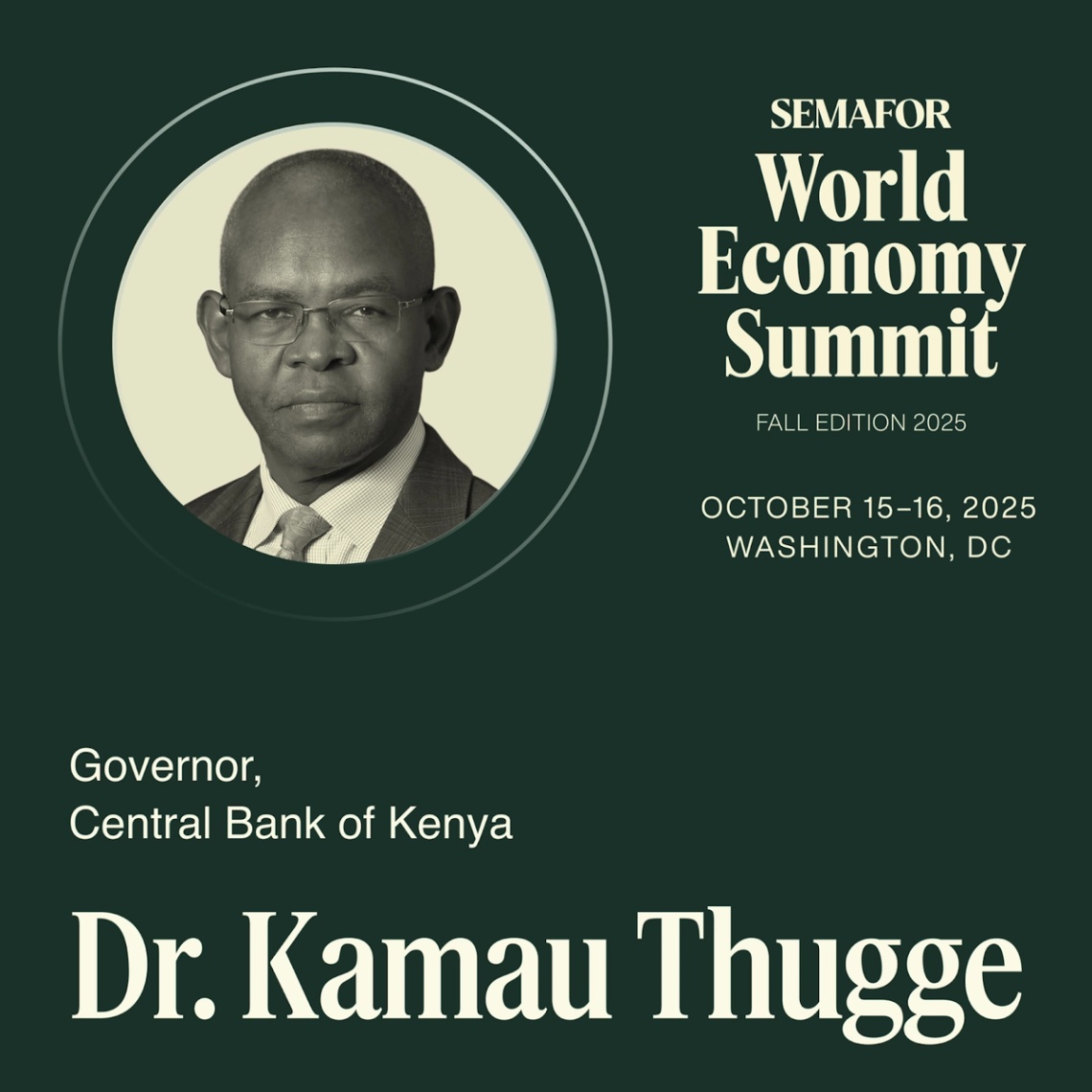 Dr. Kamau Thugge, Governor, Central Bank of Kenya, will join the stage at the Fall Edition of Semafor’s World Economy Summit. Hosted in the Gallup Great Hall and spanning eight sessions over two days, Semafor editors will feature on-the-record interviews on the state of global growth and finance, AI advancements, powering global energy needs, and the forces reshaping the world economy. Each session brings together the leaders and forces most directly shaping the global economy, with programming powered by Semafor’s world-class editorial and executive leadership. Oct. 15 & 16, 2025 | Washington, DC | Request Invitation |
|
Person of Interest: Mamady Doumbouya |
 Brendan McDermid/Reuters Brendan McDermid/ReutersGuinea’s coup leader Mamady Doumbouya could run for president in the country’s newly announced Dec. 28 election after a constitutional referendum cleared him to contest the position. Doumbouya has not yet confirmed if he will compete in the election, the country’s first since the 2021 coup in which he overthrew former President Alpha Condé, but many expect he will. As junta leader, Doumbouya has overseen a major crackdown on civil liberties: Several opposition leaders have been detained, prosecuted, or pushed into exile, and last year more than 50 opposition parties were dissolved. The opposition has also accused the junta of irregularities in the recent referendum that approved a new constitution which allows Doumbouya to run. The 40-year-old former French legionnaire, one of the continent’s youngest leaders, previously led Condé’s special forces unit before toppling the government. He was also among a few dozen Guinean officials the EU was looking to sanction for alleged human rights abuses. The putsch in Guinea was one of eight in West and Central Africa between 2020-2023. |
|
 - Cameroon’s opposition candidates have struggled to form a united front that could unseat President Paul Biya from his 42-year rule since he announced that he would contest October’s general election at the age of 92. Ethnic differences and corruption have posed significant stumbling blocks, Daniel Ekonde writes in Africa is a Country. The result is a long period of relative stagnation, which is likely set to continue. “Just as in 2018, Biya is poised for a landslide victory on October 12,” Ekonde predicts.
- An exodus of middle-class Nigerians — a migration known locally as “japa” — risks leaving the country without its economic engine, Jola Sonowo argues in The Republic. Rising costs, a weak naira, and frozen salaries have pushed waves of young people to seek opportunities overseas. “What future remains if the people meant to build the country are the first to leave it?” Sonowo writes, pointing out that a strong and large middle class are also key to maintaining a country’s democracy and social cohesion. “Leaving… in effect, [is] a vote of no confidence in the system’s ability to guarantee a future.”
- University rankings are a billion-dollar industry that is gradually expanding into newer markets such as institutions in sub-Saharan Africa. However, more and more Western universities, like Paris’ Sorbonne and New York’s Columbia University, are choosing to opt out of rankings companies’ metrics. Concerns are mounting that the much-published guides do not offer a full picture of education. For universities in Africa, they risk homogenizing institutions and neglecting those that fail to “game” the rankings systems, Sioux McKenna, a professor of Higher Education at Rhodes University in South Africa, writes in The Conversation.
- Plans for a single west African currency, the Eco, have been pushed back for decades, despite the opportunities a united currency would offer Africa on the global stage, Aminata Niang, a visiting fellow at the Atlantic Council think tank, writes. Disagreements generally lie between countries in one of two camps: those that currently use the CFA franc, which is pegged to the euro, and those that have their own national currencies.
|
|
|